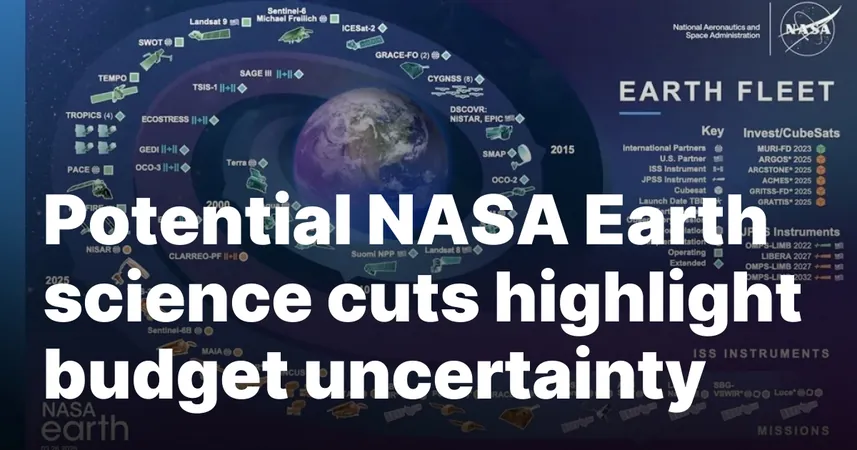
NASA's Earth Science Missions Face Major Budget Cuts: What It Means for Our Planet
2025-04-07
Author: Lok
COLORADO SPRINGS — In a shocking revelation during the 40th Space Symposium held on April 6, Rep. George Whitesides (D-Calif.) announced that several NASA Earth science missions are poised to prepare termination plans, reflecting the unsettling prospect of significant budget cuts in the agency's scientific endeavors by fiscal year 2026.
Whitesides, who serves as the vice ranking member of the House Science Committee, expressed deep concern over the agency’s shifting focus and the impact it could have on essential Earth science programs. "This is not yet an official direction from the agency, but the very fact that we’re being asked to prepare for such scenarios is extremely troubling. I am committed to advocating for the protection of our Earth science missions,” he stated passionately.
The troubling news ignited speculation that the White House may propose drastic cuts to NASA’s science budget, with some reports suggesting reductions as steep as 50% from the current $7.3 billion allocation.
This move, if true, could severely undermine ongoing and future scientific initiatives, such as climate monitoring and environmental research, both critical for understanding and combating climate change.
Whitesides pressed Nicky Fox, NASA's associate administrator for science, on whether preparations were being made for these rumored cuts. Fox explained that NASA had yet to see the administration’s 2026 budget request, hence no concrete planning could be undertaken at that moment. "A 50% cut would result in very extreme decisions," she added, underpinning the gravity of the situation.
The chairman of the House Science Committee, Rep. Brian Babin (R-Texas), echoed a cautious optimism, urging patience before drawing any conclusions.
"I won’t lose sleep over this until we receive more detailed briefings about the budgetary situation," he commented.
Peak Uncertainty: A Critical Juncture for NASA
During an April 3 committee meeting at the National Academies' Space Science Week, Karen St. Germain, director of NASA's Earth science division, dodged questions regarding the budget, admitting that insights regarding executive orders and reorganization were beyond her pay grade.
"We are truly experiencing peak uncertainty right now," noted Shawn Domagal-Goldman, acting director of the astrophysics division.
The uncertainty looms heavily over NASA's various missions and divisions, causing delays in initiating crucial projects, including the upcoming Small Explorer astrophysics mission.
Domagal-Goldman indicated that plans would hinge on understanding the budget climate under the new administration before committing to any prospective missions.
This chaotic budgetary landscape comes alongside another troubling development: the reported termination of $420 million in “unneeded” contracts, announced by the Department of Government Efficiency. NASA officials have yet to disclose specifics on which contracts have been cut, leading to further confusion and speculation within the agency.
A Call to Action
The fate of NASA’s Earth science missions hangs in the balance, sparking a renewed conversation about the importance of these programs not only for space exploration but also for addressing pressing issues on Earth, such as climate change, natural disasters, and environmental monitoring.
As Congress prepares for the impending budget discussions, scientists, environmental advocates, and citizens alike are urged to raise their voices in support of funding these essential missions.
The upcoming fiscal year 2026 budget proposal, expected later this spring, could set a precedent for the agency’s future direction. Only time will tell if the advocacy efforts to protect NASA's Earth science missions will bear fruit or if we will witness a significant retrenchment in our pursuit of understanding our planet and preserving its future. Stay tuned as this story develops, and remember—this isn't just about science, it's about the health of our planet!




 Brasil (PT)
Brasil (PT)
 Canada (EN)
Canada (EN)
 Chile (ES)
Chile (ES)
 Česko (CS)
Česko (CS)
 대한민국 (KO)
대한민국 (KO)
 España (ES)
España (ES)
 France (FR)
France (FR)
 Hong Kong (EN)
Hong Kong (EN)
 Italia (IT)
Italia (IT)
 日本 (JA)
日本 (JA)
 Magyarország (HU)
Magyarország (HU)
 Norge (NO)
Norge (NO)
 Polska (PL)
Polska (PL)
 Schweiz (DE)
Schweiz (DE)
 Singapore (EN)
Singapore (EN)
 Sverige (SV)
Sverige (SV)
 Suomi (FI)
Suomi (FI)
 Türkiye (TR)
Türkiye (TR)
 الإمارات العربية المتحدة (AR)
الإمارات العربية المتحدة (AR)